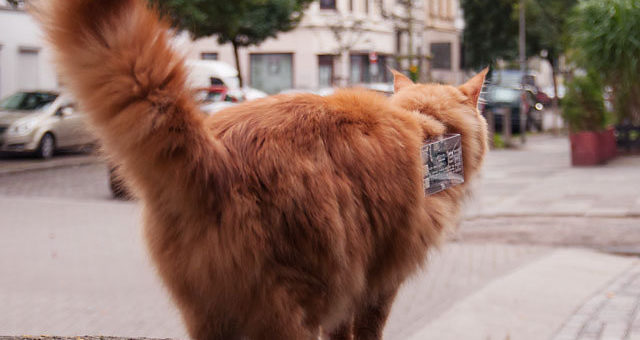This Hacker Feline Is Creating The Internet Of Cats
Published on Fast Company on April 4, 2016
On a clear day last fall, German digital media student Dennis Siegel attached a smartphone-sized Raspberry Pi computer to a tiny harness and carefully fitted the contraption onto his colleague’s cat, a fluffy Maine coon named Cosmo. The device–a small “wardrive” designed to tap into and amplify local Wi-Fi networks–transformed Cosmo from a mere kitty into a fur-covered Wi-Fi hotspot. As Cosmo wandered through a nearby park, his wardrive launched a series of commands designed to locate open Wi-Fi networks and break the encryption algorithms of those that were badly secured. After getting into a network owned by an area resident or business, Cosmo’s wardrive amplified it, allowing anyone within up to 650 feet of the cat to freely use a Wi-Fi network they hadn’t been given permission to access.
“There were plenty of Wi-Fi networks, many of them with simple WPA encryption and surprisingly a few hidden ones without any encryption,” Siegel says via e-mail, adding that the ones that use WPA2 encryption are more secure and couldn’t be broken by Cosmo’s wardrive. “…Basically one could just connect and use the Internet for whatever or use the server for sharing information or copyrighted files, running attacks, or spreading viruses.”
Originally created as a class assignment, the “playful and slightly ironic” project dubbed “Cat Exploit” is currently just a proof of concept and doesn’t limit cybercrime exclusively to felines. Foxes or raccoons “might be well suited for this stealthy task” the project website says, though training them to bring the equipment back may prove more difficult.
There’s a larger mission to Cat Exploit beyond harnessing the mighty Internet-providing power of animals. By creating mobile hotspots, Siegel hopes to show just how easy it is for strangers to gain access to private Wi-Fi networks, an ability that can be legally problematic for German network owners. Under Germany’s “Störerhaftung” third-party liability law, Wi-Fi owners can be punished for illegal activities conducted on their networks, meaning that cafe owners can be held responsible for patrons who steal music, hotels can face charges if travelers torrent TV shows during their stay, and private home owners can find themselves in hot water if someone downloads copyrighted material via a server strapped to a cat.
The widely criticized law is believed by many to be a chief reason why Germany lags behind other European nations in hotspot access. Despite the fact that the average German owns twice the number of Wi-Fi-capable devices as the average person worldwide, 2014 research from the global hotspot provider, iPass, found that there was only one hotspot for every 86 people in Germany. Poland, Belgium, the Netherlands, the United Kingdom, and the U.S. all had better Wi-Fi access, while France led the pack with one hotspot for every five people. Proposed legislation backed by Chancellor Angela Merkel would alleviate many Wi-Fi liability concerns, but whether that become official law is still up in the air.
Cat Exploit may be the first attempt to challenge Störerhaftung laws using live cats, but it’s not the first time hackers have used weaponized pets. At the 2014 DEF CON hackers convention, security researcher Gene Bransfield debuted “WarKitteh,” a cat collar with a built-in Wi-Fi scanner, memory card and GPS locator. When roaming the streets, the collar maps area Wi-Fi networks and detects which ones are open or poorly secured. Branfield’s “Denial of Service Dog” took hacking one step further by fitting a doberman pinscher with a doggie backpack equipped with a Wi-Fi Pineapple hacking tool programmed to redirect nearby devices to a video of Bransfield’s choosing, and a TV B Gone that shuts off nearby televisions. Bransfield tested the high-tech dog out in a restaurant, electronics store, and sports bar, where patrons became angry and confused when the bar’s TV inexplicably switched off during Argentina’s World Cup semi-finals game.
Dennis Siegel is hoping that Cat Exploit has a larger impact. He says he’s not sure whether the idea of strapping computers to kitties will impact German policy makers, but he hopes that Cat Exploit will help bring outdated copyright and privacy laws more to the forefront of discussion. If nothing else, it might cause you to think about your own network security whenever you see a strange cat prowling by your door.
All Images: via Dennis Siegel






